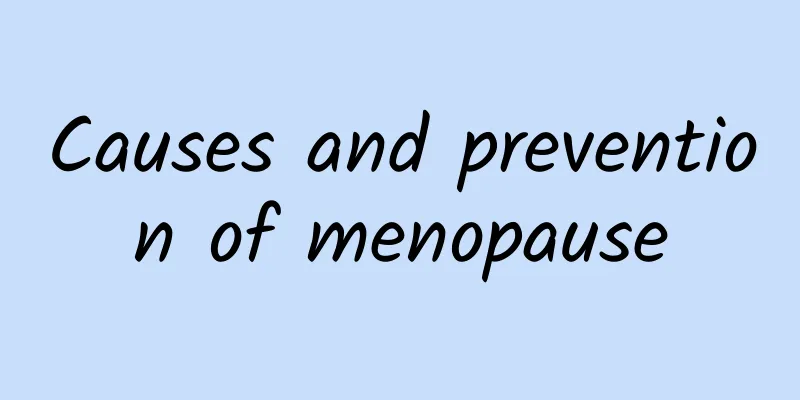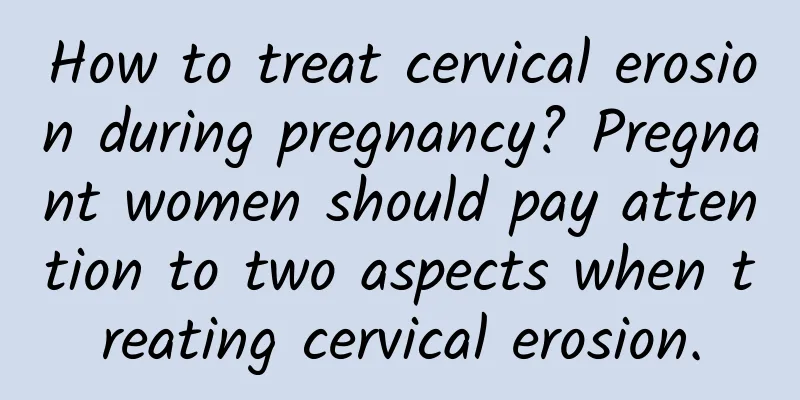Causes and prevention of menopause

|
Women's aging and menopause are inseparable, and because menopause brings many problems, many women are also uneasy about it. Before menopause, women should systematically understand the relevant knowledge, which will help them better get through this transition period. Next, we will introduce the causes and prevention methods of women's menopause. 1. Causes of menopause 1. Pathological conditions, such as severe tuberculosis, severe anemia, malnutrition, etc.; special endocrine pathological conditions, such as "obesity reproductive infertility malnutrition", etc.; damage to certain endocrine glands in the body, such as adrenal glands, thyroid glands, pancreas and other function disorders. Due to the damage of these elements, menstruation often does not come. For amenorrhea caused by these conditions, as long as the pathological conditions are cured, menstruation will come naturally. 2. Atresia of the lower genital tract, vagina, hymen, labia, etc., there is a congenital atresia, or acquired damage to form adhesion atresia. Even if there is menstruation, menstrual blood cannot flow out. This condition is called latent or pseudo-amenorrhea. Atresia of the lower genital tract can be completely cured by the treatment of a good doctor. 2. Prevention of menopause 1. If vaginal bleeding occurs after menopause, it should not be taken lightly. During perimenopause, women experience irregular vaginal bleeding; but after menopause, if you are not using hormone therapy, vaginal bleeding is not normal. At this time, you should go to the hospital for examination in time to find out the cause of the bleeding. 2. After menopause, be alert to the rapid decrease in bone density. Bone loss is most rapid in the first few years after menopause, and osteoporosis occurs when bone loss is faster than normal bone remodeling. Keeping up with physical activity can help keep bones and muscles strong. In addition, to avoid osteoporosis, you should also supplement with calcium and vitamin D. Include enough dairy products and foods rich in calcium in your diet. 3. Urinary system diseases are more likely to occur after menopause. A decrease in estrogen levels in the body can cause the urethra to become shorter and thinner, resulting in some urinary tract diseases, such as frequent and urgent urination; increased nocturia; enuresis when you urgently need to urinate, have sex, or reach orgasm; enuresis when you cough, laugh, sneeze, or lift heavy objects; and a burning sensation when you urinate. If these problems are interfering with your daily life, such as causing you to cut back on physical activity or social activities, it's best to see a doctor. |
<<: Nutrition should be increased to prevent menopause
>>: What are the ways to prevent menopause?
Recommend
What are the clinical manifestations of adnexitis?
Failure to detect the symptoms of adnexitis in ti...
Stretch out and refocus after the New Year holiday! Occupational therapists teach you 5 sets of home stretching exercises to keep you safe and healthy
This year's Chinese New Year is quite special...
Understand the diagnostic basis of vulvar leukoplakia
Nowadays, the medical community calls the whiteni...
Experts remind: The dangers of uterine adnexitis that cannot be avoided
Adnexitis is a very harmful gynecological disease...
What medicine can amenorrhea
Amenorrhea is a problem that many women struggle ...
Can you get pregnant with endometriosis?
Endometriosis is a common gynecological disease. ...
When should uterine fibroid surgery be performed? Is uterine fibroid a benign tumor?
Uterine fibroids are a common gynecological disea...
Are uterine fibroids common? What are the symptoms of uterine fibroids?
What is uterine fibroid? First, let's underst...
How to treat uterine fibroids? Can uterine fibroids be treated to preserve fertility?
Generally speaking, if you want to completely rem...
Don’t touch the green sauce! Eat pasta like this to lose weight
Many people are afraid of getting fat and dare no...
I fainted at work in the afternoon! 3 ways to do light exercise to refresh yourself better than coffee
Sitting in front of the computer, my mind gradual...
Are stones caused by excessive calcium intake? Nutritionist Chen Yichun gives 7 tips to prevent kidney stones
Don’t underestimate a small stone in your body. O...
Is it true that stress makes you gain weight? Research says...
A bakery manager once came to consult about weigh...
Can't I blow dry my hair after an abortion? Can I go out?
Abortion is artificial miscarriage. After the abo...
Is it more painful to have a medical abortion or a surgical abortion?
Medical abortion and surgical abortion are two co...









